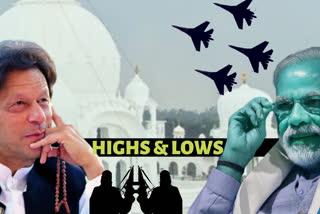Islamabad: Pakistan and India were almost on the brink of war in 2019 following the Pulwama terror attack that killed dozens of CRPF soldiers and prompted New Delhi to carry out airstrikes on terror camps in Pakistan, but the year ended on a somewhat positive note as they inaugurated a historic corridor to facilitate the visa-free visit of Sikh pilgrims to Kartarpur.
Imran Khan's rise to power in August 2018 prompted the exchange of pleasantries between the cricketer-turned-politician and Prime Minister Narendra Modi.
But a lot happened in the intervening months that not only deepened the perennial enmity but brought the two sides to the brink of war.
The brief spell of goodwill was broken by a deadly attack in Jammu and Kashmir's Pulwama on February 14, 2019, by Pakistan-based Jaish-e-Mohammad terror group that killed 40 CRPF soldiers.
New Delhi blamed Islamabad and vowed revenge, though the former rejected allegations. On February 26, Indian fighter jets entered deep inside Pakistan and bombed JeM terror camps in Balakot. It was for the first time that Indian jets entered Pakistan to drop bombs after the 1971 War.
The airstrike was followed by aerial combat between air forces of the two countries on February 27 when Pakistan jets entered India. While chasing Pakistani jet an Indian Air Force jet crashed in Pakistan occupied Kashmir following which its injured pilot was captured.
For a moment, it appeared that the worst moment in the hostility of the two nations has just arrived. But sanity prevailed and Pakistan quickly announced to release the Indian pilot and the two sides walked back from the cliff.
As tempers were still high amidst elections in India, Khan said in an interview in April that the two countries would make strides towards peace if Prime Minister Modi won elections.
Sometimes wishes come true. Modi won and the two countries agreed to sit together to discuss an agreement to formalize the movement of Indian Sikh pilgrims visiting Kartarpur without visas.
While the ice melted and the process of engaging with each other was being rebooted, the Modi government made a move to make good on some of the election promises, including one about ending the special status of Jammu and Kashmir.
The strained ties between India and Pakistan further nose-dived following the abrogation of Article 370 in August that revoked the special status of Jammu and Kashmir.
The move angered Pakistan, which downgraded diplomatic ties with India and expelled the Indian High Commissioner. Islamabad also snapped all air and land links with India and suspended trade and railways ties.
Doubts were also expressed about the fate of the landmark Kartarpur corridor that the two sides had promised to open before the 550th birth anniversary of Guru Nanak Dev, the founder of Sikhism.
Despite their verbal duels, the corridor was operationalised on time.
